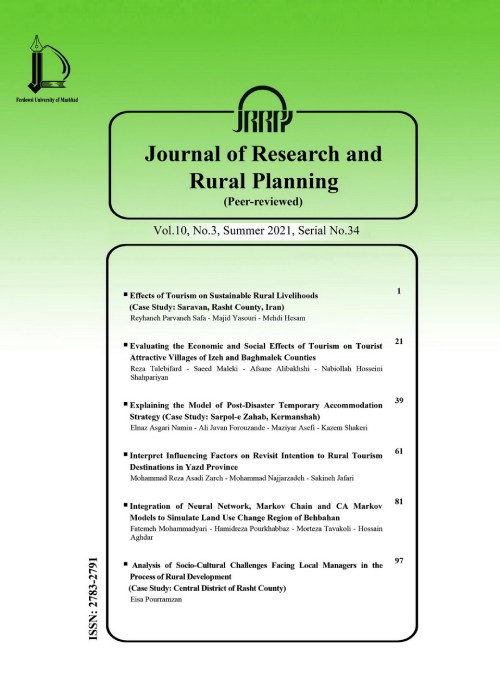Pro-Poor Tourism: A Strategy for Concordant and Sustainable Development of Rural Communities (Case Study: Vali-e-Asr Village in the Vicinity of Persepolis)
Author(s):
Abstract:
Purpose
In the last two decades, tourism industry has attached great importance and transformed into one of the key factors for development in many countries. Nowadays, efforts have been made to empower rural poor class through participating in the process of tourism benefits. Ultimate goal of these endeavors is improving life quality and reducing rural poverty. Methodology
Using qualitative and quantitative analysis methods, this research investigates the impacts of tourism on different aspects of Vali-e-Asr village of Marvdasht County, Fars, Iran. The main research question is that has tourism had any impacts on economic, socio-cultural and environmental aspects of the residents of Vali-e-Asr village in the vicinity of Persepolis? To answer this question, 20 indicators including economic, socio-cultural and environmental have been identified and the impact of each indicator has been ranked based on experts’ opinions. For collecting data, 12 interviews were conducted with experts and 67 questionnaires from rural households have been completed. Findings
The results show that although tourism has had positive impacts on cultural and environmental aspects like language skills and raising awareness of residents about the environment, for the economic aspect despite creating limited direct and indirect jobs it failed in reducing rural poverty. Research limitation: The major limitation of the study is the lack of accurate statistics about the number of foreigners visiting the Persepolis. Practical implications: The most practical solutions are removal of obstacles and limitations preventing people from participation in tourism activities. On the other hand, since no NGOs are allowed to compete with governmental organizations, there is no competition among stakeholders in the region and benefits of tourism are restricted to government institutions. Hence, all stakeholders should be allowed to participate in tourism activities.Keywords:
Tourism , poverty , Persepolis , Vali , e , Asr Village
Language:
Persian
Published:
Journal of Research and Rural Planning, Volume:4 Issue: 2, 2015
Pages:
35 to 49
magiran.com/p1450097
دانلود و مطالعه متن این مقاله با یکی از روشهای زیر امکان پذیر است:
اشتراک شخصی
با عضویت و پرداخت آنلاین حق اشتراک یکساله به مبلغ 1,390,000ريال میتوانید 70 عنوان مطلب دانلود کنید!
اشتراک سازمانی
به کتابخانه دانشگاه یا محل کار خود پیشنهاد کنید تا اشتراک سازمانی این پایگاه را برای دسترسی نامحدود همه کاربران به متن مطالب تهیه نمایند!
توجه!
- حق عضویت دریافتی صرف حمایت از نشریات عضو و نگهداری، تکمیل و توسعه مگیران میشود.
- پرداخت حق اشتراک و دانلود مقالات اجازه بازنشر آن در سایر رسانههای چاپی و دیجیتال را به کاربر نمیدهد.
دسترسی سراسری کاربران دانشگاه پیام نور!
اعضای هیئت علمی و دانشجویان دانشگاه پیام نور در سراسر کشور، در صورت ثبت نام با ایمیل دانشگاهی، تا پایان فروردین ماه 1403 به مقالات سایت دسترسی خواهند داشت!
In order to view content subscription is required
Personal subscription
Subscribe magiran.com for 70 € euros via PayPal and download 70 articles during a year.
Organization subscription
Please contact us to subscribe your university or library for unlimited access!


